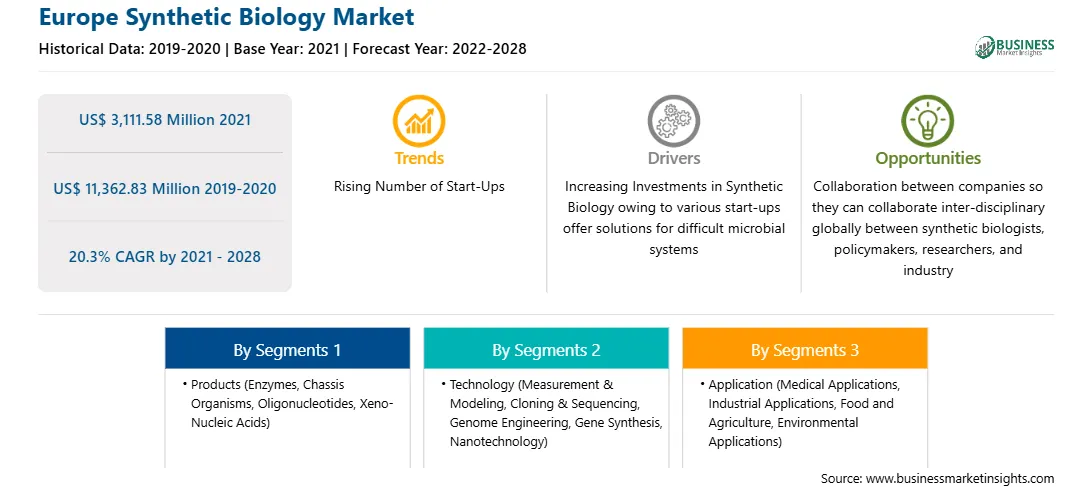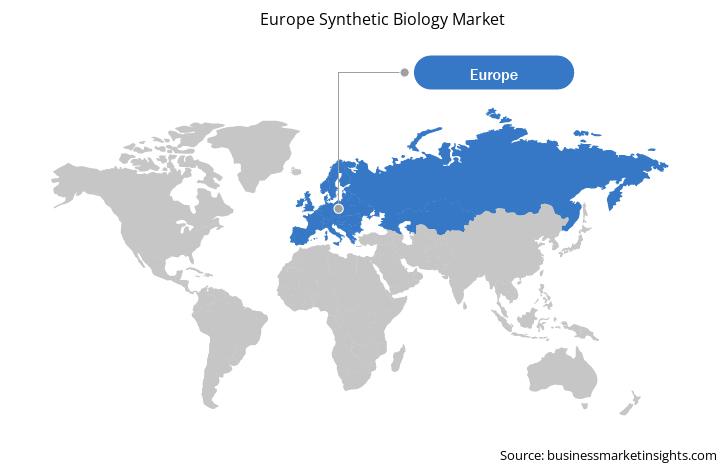Many start-ups are emerging in developing countries, as governments are providing funds for the domestic development of synthetic biology. Siolta Therapeutics produces therapeutic microbial consortia to prevent and treat inflammatory illnesses. It evaluates clinical data and develops mixed-species therapies for oral supplementation. Unlike existing medications for allergies, the microbiome-based approach operates before the onset of the immune dysfunction cascade. STMC-103H, a flagship therapeutic candidate of Siolta Therapeutics, is being studied for the treatment of allergic asthma as well as other chronic inflammatory illnesses, including atopic dermatitis and allergic rhinitis. Similarly, Kinnva Ltd., established in 2017, is a synthetic biology start-up catering to biotech, cleantech, and Agri-tech segments. Using a unique fermentation technology and sophisticated processing methods, Kinnva produces high value biochemicals for applications in the food, feed, nutraceuticals, and cosmetics industries. Thus, start-ups are contributing significantly to the synthetic biology market expansion across the region.
With the new features and technologies, vendors can attract new customers and expand their footprints in emerging markets. This factor is likely
to drive the Europe synthetic biology market. The Europe synthetic biology market is expected to grow at a significant CAGR during the forecast period.
Strategic insights for the Europe Synthetic Biology provides data-driven analysis of the industry landscape, including current trends, key players, and regional nuances. These insights offer actionable recommendations, enabling readers to differentiate themselves from competitors by identifying untapped segments or developing unique value propositions. Leveraging data analytics, these insights help industry players anticipate the market shifts, whether investors, manufacturers, or other stakeholders. A future-oriented perspective is essential, helping stakeholders anticipate market shifts and position themselves for long-term success in this dynamic region. Ultimately, effective strategic insights empower readers to make informed decisions that drive profitability and achieve their business objectives within the market.

| Report Attribute | Details |
|---|---|
| Market size in 2021 | US$ 3,111.58 Million |
| Market Size by 2028 | US$ 11,362.83 Million |
| Global CAGR (2021 - 2028) | 20.3% |
| Historical Data | 2019-2020 |
| Forecast period | 2022-2028 |
| Segments Covered |
By Products
|
| Regions and Countries Covered | Europe
|
| Market leaders and key company profiles |
The geographic scope of the Europe Synthetic Biology refers to the specific areas in which a business operates and competes. Understanding local distinctions, such as diverse consumer preferences (e.g., demand for specific plug types or battery backup durations), varying economic conditions, and regulatory environments, is crucial for tailoring strategies to specific markets. Businesses can expand their reach by identifying underserved areas or adapting their offerings to meet local demands. A clear market focus allows for more effective resource allocation, targeted marketing campaigns, and better positioning against local competitors, ultimately driving growth in those targeted areas.

Europe Synthetic Biology Market Segmentation
The Europe synthetic biology market is analyzed based on products, technology, application, and country. Based on products, the market is segmented into enzymes, chassis organisms, oligonucleotides, and xeno-nucleic acids. The oligonucleotides segment dominated the market in 2020 and is expected to continue to grow at the fastest rate during the forecast period. Based on technology, the market is segmented into measurement & modeling, cloning & sequencing, genome engineering, gene synthesis, nanotechnology, and others. The gene synthesis segment dominated the market in 2020, while the genome engineering segment is expected to grow at the fastest CAGR during the forecast period. Based on application, the market is segmented into medical applications, industrial applications, food and agriculture, environmental applications, and others. The medical applications segment dominated the market in 2020 and is expected to grow at the highest CAGR during the forecast period. The Europe synthetic biology market is segmented into the UK, Germany, France, Italy, Spain, and Rest of Europe.
Agilent Technologies, Inc.; Amyris; Codexis; Genscript Biotech corporation; Integrated DNA Technologies; Merck KGaA; New England Biolabs; Novozymes A/S; Thermo Fisher Scientific; and Twist Bioscience are among the leading companies in the Europe synthetic biology market.
The Europe Synthetic Biology Market is valued at US$ 3,111.58 Million in 2021, it is projected to reach US$ 11,362.83 Million by 2028.
As per our report Europe Synthetic Biology Market, the market size is valued at US$ 3,111.58 Million in 2021, projecting it to reach US$ 11,362.83 Million by 2028. This translates to a CAGR of approximately 20.3% during the forecast period.
The Europe Synthetic Biology Market report typically cover these key segments-
The historic period, base year, and forecast period can vary slightly depending on the specific market research report. However, for the Europe Synthetic Biology Market report:
The Europe Synthetic Biology Market is populated by several key players, each contributing to its growth and innovation. Some of the major players include:
The Europe Synthetic Biology Market report is valuable for diverse stakeholders, including:
Essentially, anyone involved in or considering involvement in the Europe Synthetic Biology Market value chain can benefit from the information contained in a comprehensive market report.